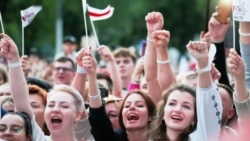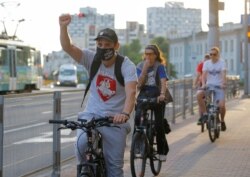On July 23, Aleksandr Lukashenko, president of Belarus, expressed frustration with the way officials in his administration and government ministries have been handling hard-hitting media coverage of opposition protests in the country since May.
Lukashenko said his administration, press secretary and ministries have been doing nothing to stop the “dirt-spitting” press.
“We are the landlords of this country! So do your duties, if you can’t just say so, others will do the job!” he said in a video meeting with the officials.
Lukashenko then scolded Belarusian Foreign Minister Vladimir Makei, who stood and listened with his head down.
“In the foreign ministry everybody just sits and waits for the president’s orders! Why do you tolerate them? You’ve accredited them here, so don’t wait for an end of the election campaign, expel them!” Lukashenko said.
That was after claiming the British Broadcasting Corporation (BBC) and the U.S. government-funded Radio Free Europe/Radio Liberty (RFE/RL) “go beyond biased reporting” and “call for mass riots.”
That claim is false.
In their extensive coverage of the protests and upcoming presidential election in Belarus, neither the BBC nor RFE/RL has “called for mass riots.”
Ad Fontes Media, an independent group that monitors media bias, rated BBC “neutral/balanced” in terms of bias and “most reliable” in terms of trustworthiness.
The Media Bias/Fact Check website, a partner in the Poynter Institute’s global fact-checking network, rated RFE/RL as “least biased” in terms of using “neutral language” and “balance of coverage.” The website rated RFE/RL’s reporting as mostly factual, though at times tilting pro-USA.
Lukashenko, 65, a former communist and political officer in the Soviet army, has been ruling Belarus since 1994, when the office of president was established after the country regained its independence following the collapse of the Soviet Union.
Lukashenko’s popularity has diminished over the last several years as the country struggled with economic stagnation and low wages. In May, hundreds of protesters took to the streets to protest his response to the COVID-19 pandemic, which he said could not cause harm if people drank vodka every day and took a sauna more often.
Then, on Tuesday, July 28, Lukashenko announced that he was an asymptomatic COVID-19 carrier. “Ninety-seven percent of Belarusians who contract the virus will recover without showing any symptoms,” he said.
According to the Johns Hopkins University & Medicine, Belarus had 67,366 confirmed COVID-19 infections and 543 reported deaths as of the day Lukashenko revealed his infection.
Experts the tally puts Belarus is among the worst counties in eastern Europe in terms of its government’s response to coronavirus.
The “coronavirus protests” that started in the capital Minsk in May, became known as the “slipper revolution” after a leading opponent referred to Lukashenko as a “cockroach” and called on voters to “squash the pest” in the Aug. 9 presidential election.
Author Daniel Kalder, who has written books about the literature of dictators, describes the genesis of the revolution in a recent analysis published by the online magazine UnHerd.
"[T]he dam seems to have burst when a popular YouTuber, Sergei Tikhanovsky, cracked a gag about Lukashenko’s moustache, comparing it to a cockroach, and then took to driving around in a van with a giant slipper — the most popular form of pest control in the country — on it. All of a sudden, protestors took to the streets of Minsk with slippers in hand and foreign analysts were talking up a potential “slipper revolution."
Lukashenko has said he personally ordered Tikhanosvsky’s arrest. In mid-June, he also accused his leading rival, Viktor Babariko, of corruption. Reuters reported that the accusation came the day after local offices of Russia’s Gazprombank, headed by Babariko, were raided in a tax evasion case. Babariko, who gathered 400,000 signatures for his candidacy, was jailed.
A third candidate, former ambassador to the United States Valery Tsepkalo was disqualified after officials rejected most of the 160,000 signatures his campaign collected, a ruling Tsepkalo said was political. He has since fled to Moscow with his children.
With his male political rivals barred from registering as candidates and/or arrested, Lukashenko now faces an unexpected challenge: an all-female trio representing the united opposition. The front-runner is Svetlana Tikhanovskaya, 37, the wife of the jailed blogger and mother of two, who first stepped in as a placeholder for her husband. Also, in the group is Tsepkalo’s wife, Veronika.
Lukashenko’s reaction? Sexist and patronizing.
On May 29, during a meeting with the workers at the Minsk tractor factory, a man asked Lukashenko his opinion about political opponents. Lukashenko mentioned “these men who do nothing but brag on the Internet,” then, turned to the women candidates.
“Nobody will vote for a woman. The Belarusian society is not mature enough to vote for a woman. Our constitution is not fit for a woman because it gives the president a lot of power. The president will be a guy, I am absolutely sure of it.”
Anger over Lukashenko’s comments was the reason they “turned into politics,” Belarusian women interviewed by BBC explained. Many joined opposition protests for the first time because the president’s sexism reflected the overall marginalization of women in society, and that needs to change, they said.
On June 20, when speaking at the WWII memorial in the city of Mogilev, Lukashenko’s attempt at damage control backfired. “There are attempts now to push me against the women. Remember, I said once that in Belarus a woman can’t become a president yet,” he complained to the crowd.
“What I meant was that our Constitution is such that even for a tough guy it is hard to carry its burden. If you load that on a woman, she will collapse, poor thing. That’s what I meant, not because I don’t respect women.”
Tikhanovskaya, described initially as a “reluctant candidate,” has since spoken to crowds of thousands, delivered a TV address and received endorsements from across the political spectrum, becoming Lukashenko’s main challenger. According to the Guardian newspaper, it was her interview with the BBC that caused Lukashenko’s anti-media outburst.
“We have a dictator as a head of our country. You can’t say anything, do anything, everything is forbidden,” Thikhanovskaya told BBC in a July 22 interview. She was “afraid” because the state “can do anything” to her, she said, even take her children away and place them in an orphanage.
Asked whether she believed if she can win the presidential bid, Tikhanovskaya said, “We don’t believe in honest elections. But I still believe that our president will understand, that his time is over. People don’t want him anymore.”
None of the past five presidential elections in Belarus has been rated free and fair. International observers, including the Organization for Security and Cooperation in Europe accused Lukashenko of abusing administrative powers to forge the votes and secure his victory.
Observers are skeptical the Aug. 9 vote will be any different, with Lukashenko holding a “monopoly on violence and control of the ballot box,” Markos Kounalakis, a visiting fellow at the Hoover Institution, wrote in an analysis of the situation.
The constitution of Belarus sets one presidential term at five years. Initially, it included a two-term limit for the same person to serve as president. That was lifted in 1996.







